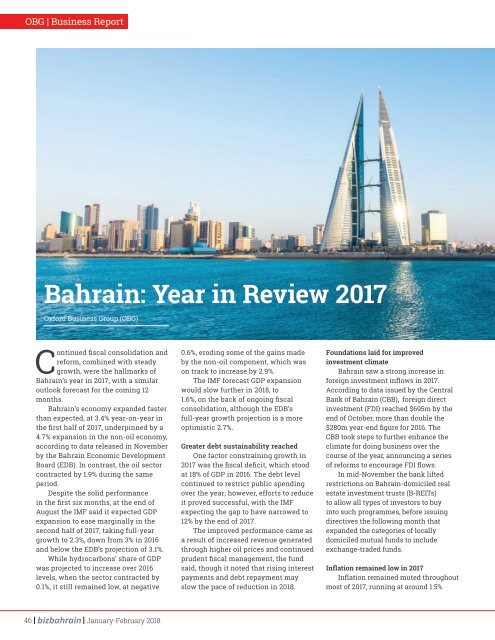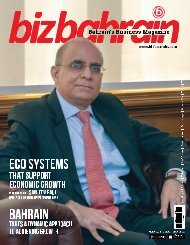You also want an ePaper? Increase the reach of your titles
YUMPU automatically turns print PDFs into web optimized ePapers that Google loves.
OBG | Business Report<br />
Bahrain: Year in Review 2017<br />
Oxford Business Group (OBG)<br />
Continued fiscal consolidation and<br />
reform, combined with steady<br />
growth, were the hallmarks of<br />
Bahrain’s year in 2017, with a similar<br />
outlook forecast for the coming 12<br />
months.<br />
Bahrain’s economy expanded faster<br />
than expected, at 3.4% year-on-year in<br />
the first half of 2017, underpinned by a<br />
4.7% expansion in the non-oil economy,<br />
according to data released in November<br />
by the Bahrain Economic Development<br />
Board (EDB). In contrast, the oil sector<br />
contracted by 1.9% during the same<br />
period.<br />
Despite the solid performance<br />
in the first six months, at the end of<br />
August the IMF said it expected GDP<br />
expansion to ease marginally in the<br />
second half of 2017, taking full-year<br />
growth to 2.3%, down from 3% in 2016<br />
and below the EDB’s projection of 3.1%.<br />
While hydrocarbons’ share of GDP<br />
was projected to increase over 2016<br />
levels, when the sector contracted by<br />
0.1%, it still remained low, at negative<br />
0.6%, eroding some of the gains made<br />
by the non-oil component, which was<br />
on track to increase by 2.9%.<br />
The IMF forecast GDP expansion<br />
would slow further in <strong>2018</strong>, to<br />
1.6%, on the back of ongoing fiscal<br />
consolidation, although the EDB’s<br />
full-year growth projection is a more<br />
optimistic 2.7%.<br />
Greater debt sustainability reached<br />
One factor constraining growth in<br />
2017 was the fiscal deficit, which stood<br />
at 18% of GDP in 2016. The debt level<br />
continued to restrict public spending<br />
over the year; however, efforts to reduce<br />
it proved successful, with the IMF<br />
expecting the gap to have narrowed to<br />
12% by the end of 2017.<br />
The improved performance came as<br />
a result of increased revenue generated<br />
through higher oil prices and continued<br />
prudent fiscal management, the fund<br />
said, though it noted that rising interest<br />
payments and debt repayment may<br />
slow the pace of reduction in <strong>2018</strong>.<br />
Foundations laid for improved<br />
investment climate<br />
Bahrain saw a strong increase in<br />
foreign investment inflows in 2017.<br />
According to data issued by the Central<br />
Bank of Bahrain (CBB), foreign direct<br />
investment (FDI) reached $695m by the<br />
end of October, more than double the<br />
$280m year-end figure for 2016. The<br />
CBB took steps to further enhance the<br />
climate for doing business over the<br />
course of the year, announcing a series<br />
of reforms to encourage FDI flows.<br />
In mid-November the bank lifted<br />
restrictions on Bahrain-domiciled real<br />
estate investment trusts (B-REITs)<br />
to allow all types of investors to buy<br />
into such programmes, before issuing<br />
directives the following month that<br />
expanded the categories of locally<br />
domiciled mutual funds to include<br />
exchange-traded funds.<br />
Inflation remained low in 2017<br />
Inflation remained muted throughout<br />
most of 2017, running at around 1.5%<br />
46 January-February <strong>2018</strong>

















